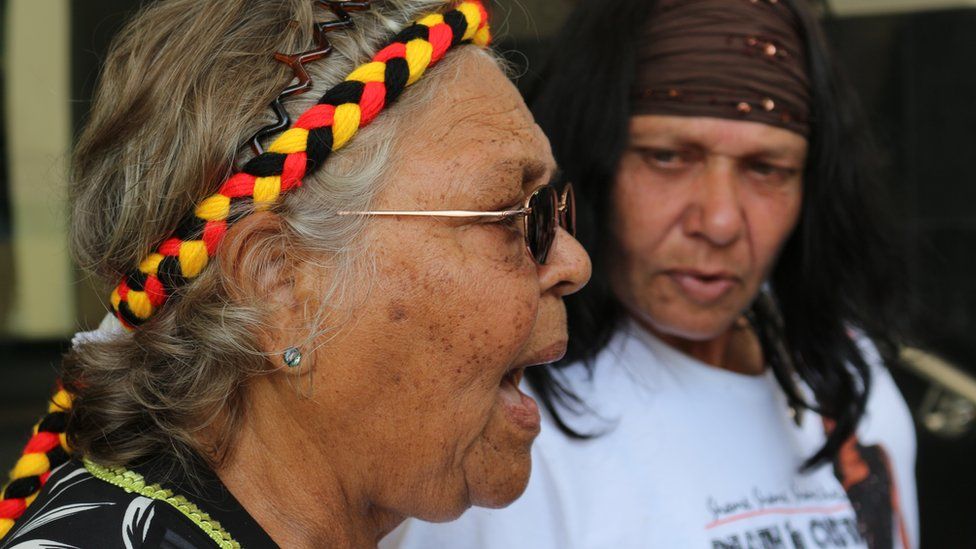Ms Dhu inquest: family calls delay 'a betrayal'
- Published

The family of an Aboriginal woman who died in police custody after three visits to hospital have voiced their anger and disbelief as a crucial part of a painful inquest is delayed.
It was a difficult and at times dramatic week. The family of the woman, known as Ms Dhu - her real name is not being used at her family's request - believes she would still be alive had she been white.
Whether Ms Dhu would have died if her skin was a different colour is one of the key questions the inquest at Perth's Central Law Courts is seeking to answer.
But after a week of testimony, where doctors strongly denied accusations of racism, it was announced that cross-examination of police would only take place in March 2016.
A central allegation is that police officers downplayed the seriousness of the infection that killed the 23-year-old while she was in custody in August 2014.
But Coroner Ros Fogliani said the police witness testimonies couldn't take place until March 2016 because the inquest had fallen too far behind schedule.
For Ms Dhu's family, this was a "betrayal".
"It's an insult to the family. It's a massive insult after what they've done to Ms Dhu," her uncle and family spokesman Shaun Harris said.
"By March the police are going to be testifying that they 'don't recall'. We've already heard it all this week and it's been 14 months. Imagine four more months."
The police have made no public comment yet.
Three trips to hospital
This week it was the medical professionals who treated her who presented evidence. All of them denied that race played a role in their decisions.
After being arrested on 2 August 2014 on a warrant for unpaid fines, Ms Dhu was taken into custody at South Hedland Police Station, just outside the remote mining town of Port Hedland.
She soon began to complain of rib pain from an old injury she had re-fractured days before. Notes taken by the attending doctor at South Hedland Health Campus, Dr Anne Lang, attributed the pain to "behavioural gain" in her notes. Ms Dhu was returned to police custody.
The next day Ms Dhu was taken to hospital for a second time, and was this time seen by Dr Vafa Naderi. Again she was returned to custody on the basis that her pain was due to "behavioural issues".
One day later she was dead.
The inquest was shown CCTV footage of police dragging her limp and handcuffed frame to the door of her cell before carrying her by the arms and legs to the back of the vehicle that would take her to hospital for a third time.
The cause of death was severe staphylococcal septicaemia and pneumonia resulting from a broken rib. Nurse Caroline Jones was one of the hospital staff present on the day she died. She told the inquest that she believed Ms Dhu had no pulse when she was wheeled in through the hospital waiting room.
Giving testimony, Dr Lang admitted her notes were "unacceptable". She told that inquest that Ms Dhu had been a difficult patient to get answers from, but at no point did she believe Ms Dhu was "drug-seeking" or "faking it". She did, however, believe that her patient may be exaggerating her symptoms in order to get pain relief.
"I found her gait to be a little bit artificial, perhaps to be a little bit attention-seeking. But that didn't mean that I didn't think she had pain in her chest wall," she told the inquest.
She told the court she was haunted by Ms Dhu's death, but while she often asked herself what she would have done differently, she did not think spending more time with Ms Dhu at the time would have changed her thinking,
'Benefit of hindsight'
The head of the South Hedland Health Campus, Dr Ganesan Sakarapani, denied allegations of institutional racism at his hospital when he appeared before the inquest on Thursday,
"I would categorically reject that," he said. "At the regional and local level, the leadership has cultivated awareness and respect for our indigenous patients.
"We do not have a culture of institutional racism at our hospital," he said, also defending Dr Lang and Dr Naderi.
Dr Sakarapani said it was easy to criticise his doctors with the benefit of hindsight, but stressed they made a decision in a busy emergency room on a long weekend with a patient he understood to be unco-operative.
He did acknowledge that were defects in hospital procedure, but emphasised these were in the process of being addressed.
But earlier in the week, Dr Sandra Thompson, an indigenous health expert, testified that were Ms Dhu "a white, middle class person", more of an effort would have been made to find the cause of her pain.
Ms Dhu's family has no doubt that her race played a role in her death.
"She was treated like a dog," her father said during his testimony on the first day. The family said they would stage a protest on Friday next week.
The inquest will continue from Tuesday next week with more testimony from medical professionals.